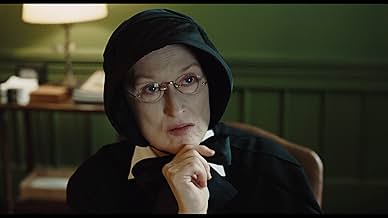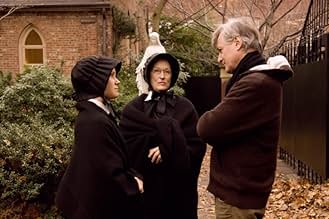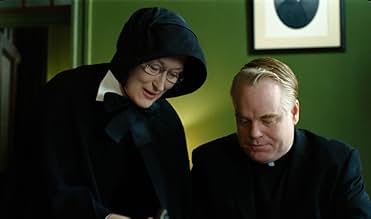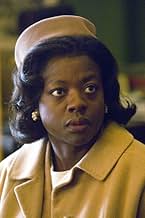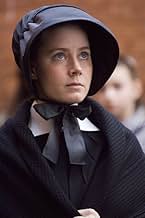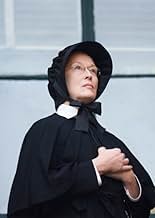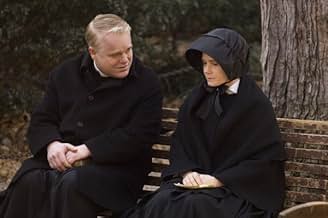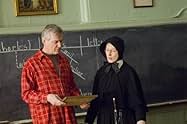Ein katholische Schulleiterin hinterfragt die zweideutige Beziehung eines Priesters zu einem schwierigen jungen Schüler.Ein katholische Schulleiterin hinterfragt die zweideutige Beziehung eines Priesters zu einem schwierigen jungen Schüler.Ein katholische Schulleiterin hinterfragt die zweideutige Beziehung eines Priesters zu einem schwierigen jungen Schüler.
- Für 5 Oscars nominiert
- 25 Gewinne & 97 Nominierungen insgesamt
Joseph Foster
- Donald Miller
- (as Joseph Foster II)
Empfohlene Bewertungen
I'm not going to give a long or exhaustive review. A bazillion others have and the movie was released over a year ago--so my giving any sort of in-depth analysis is just needless repetition.
The movie's biggest strength is the acting. All three leading actors did a fine job and this was necessary to carry a film that has no special effects, explosions or love scenes. The vagueness of the film is also a strength. After all, the film gets you thinking and yet there is definitely no clear-cut answer as to what really occurred in the film. There is lots of room to foster discussions and debate. And, while I am a strongly opinionated person, I wouldn't have changed much of the film at all--except the very, very end when Meryl Streep's character, for the first and only time, shows some doubt and emotion. This just didn't seem true to her character. Still, this is a minor concern--and who am I to say, since I didn't win the Pulitzer Prize (last time I checked)! Some may hate the vagueness and want a very clear explanation as to what, exactly, the Father did--if anything. Some may hate that the film actually isn't vague enough (I slightly tend towards that). But what I love about all this is that so many different people see so many different things--mostly based on their own prior experiences and expectations. I could easily see someone seeing gay issues, pedophilia (and it's talked ABOUT but never even explicitly said) or a thousand other possibilities--or it could simply be a metaphor for McCarthyism. Who knows? And that makes the film so interesting.
The movie's biggest strength is the acting. All three leading actors did a fine job and this was necessary to carry a film that has no special effects, explosions or love scenes. The vagueness of the film is also a strength. After all, the film gets you thinking and yet there is definitely no clear-cut answer as to what really occurred in the film. There is lots of room to foster discussions and debate. And, while I am a strongly opinionated person, I wouldn't have changed much of the film at all--except the very, very end when Meryl Streep's character, for the first and only time, shows some doubt and emotion. This just didn't seem true to her character. Still, this is a minor concern--and who am I to say, since I didn't win the Pulitzer Prize (last time I checked)! Some may hate the vagueness and want a very clear explanation as to what, exactly, the Father did--if anything. Some may hate that the film actually isn't vague enough (I slightly tend towards that). But what I love about all this is that so many different people see so many different things--mostly based on their own prior experiences and expectations. I could easily see someone seeing gay issues, pedophilia (and it's talked ABOUT but never even explicitly said) or a thousand other possibilities--or it could simply be a metaphor for McCarthyism. Who knows? And that makes the film so interesting.
'Doubt' has turned out to be quite a fascinating puzzle. The story is pretty much told through dialogue rather than portrayal of events. Shanley's overwhelming screenplay is so effective and the element of mystery is carried out so strongly that even the viewer is left doubting the actions of the priest and the motives of the head nun (were her accusations legitimate or was it all an intent to ruin the priest). His incredible direction takes us through the psyche of the four principle characters.
Needless to say, the outstanding performances are just the necessary requirements that Shanley has successfully met. After all, who could ask for a better cast than Meryl Streep, Philip Seymour Hoffman, Amy Adams and Viola Davis? All these actors display some of the best acting of their career. It is both the dialogue delivery and the non-verbal gestures that strengthens the doubts in the viewers mind and makes the characters nonetheless more convincing.
The slightly washed-out colours give the look of the 60s but also adds to the mysterious atmosphere. 'Doubt' is a very thought-provoking film. It has one questioning. Should the nun have reacted or should she have waited for evidence? But what if it was already too late for evidence? What has doubt done to them? It has them questioning themselves constantly. It has stolen their sleep. We accept that it is human to doubt but what does doubt do to us? What kind of power does it hold above us? How do we react on it? When should we react on it? The director beautifully manages to convey and provoke this without appearing pretentious or preachy.
Needless to say, the outstanding performances are just the necessary requirements that Shanley has successfully met. After all, who could ask for a better cast than Meryl Streep, Philip Seymour Hoffman, Amy Adams and Viola Davis? All these actors display some of the best acting of their career. It is both the dialogue delivery and the non-verbal gestures that strengthens the doubts in the viewers mind and makes the characters nonetheless more convincing.
The slightly washed-out colours give the look of the 60s but also adds to the mysterious atmosphere. 'Doubt' is a very thought-provoking film. It has one questioning. Should the nun have reacted or should she have waited for evidence? But what if it was already too late for evidence? What has doubt done to them? It has them questioning themselves constantly. It has stolen their sleep. We accept that it is human to doubt but what does doubt do to us? What kind of power does it hold above us? How do we react on it? When should we react on it? The director beautifully manages to convey and provoke this without appearing pretentious or preachy.
10kosmasp
And when I say dark, I'm not referring to the clothes in the movie. It's morally ambiguous and it might leave you with more questions than answers, but it's striking nevertheless. The powerhouse performances we get to see in this movie, are worthy Oscar contenders and leave free interpretations as to which character will be to your liking (or which character you despise the most).
While many movies do give you moral clarity, this one plays with many things, that are never fully uncovered ... or maybe they are and I'm just not willing to accept them? Actually it leaves room for some interpretations of things that went down (no pun intended). It's about guilt, it's about doubt and many other things, that makes us human. How you receive the movie might say a lot more about yourself than the movie itself. Which is a great thing. A movie that actually makes you think, even long after the credits finished ...
While many movies do give you moral clarity, this one plays with many things, that are never fully uncovered ... or maybe they are and I'm just not willing to accept them? Actually it leaves room for some interpretations of things that went down (no pun intended). It's about guilt, it's about doubt and many other things, that makes us human. How you receive the movie might say a lot more about yourself than the movie itself. Which is a great thing. A movie that actually makes you think, even long after the credits finished ...
Watch this movie once, with the idea that Fr. Flynn is guilty. Then watch it again, with the idea that he is innocent. Or do it the other way around. Shanley's dialogue is so perfectly, brilliantly ambiguous that this is really two movies in one. Both are powerful, and both possibilities are horrible to contemplate, for very different reasons.
Having seen both the play (during its original run with Cherry Jones and Brian F. O'Byrne) and the film, the play obviously has the edge because it's more intimate, consisting only of four characters. The film expands its milieu (as film versions of plays typically do) but I think having the schoolchildren, other nuns, and school staff present in the film diminishes it just a bit. The play, of course, is about "knowing" things that we don't actually know, and the movie shows us some of what the play leaves to the imagination. Although the ultimate question remains ambiguous, the viewer may be distracted by looking for clues in the other characters, especially the kids.
What gives this piece its power, though, on both stage and screen, is its stubborn refusal to answer that ultimate question, or to provide any solid evidence of either conclusion, leaving it entirely up to the viewer to judge these characters.
Having seen both the play (during its original run with Cherry Jones and Brian F. O'Byrne) and the film, the play obviously has the edge because it's more intimate, consisting only of four characters. The film expands its milieu (as film versions of plays typically do) but I think having the schoolchildren, other nuns, and school staff present in the film diminishes it just a bit. The play, of course, is about "knowing" things that we don't actually know, and the movie shows us some of what the play leaves to the imagination. Although the ultimate question remains ambiguous, the viewer may be distracted by looking for clues in the other characters, especially the kids.
What gives this piece its power, though, on both stage and screen, is its stubborn refusal to answer that ultimate question, or to provide any solid evidence of either conclusion, leaving it entirely up to the viewer to judge these characters.
Wow! Incredible performances from Meryl Streep and Philip Seymore Hoffman. Mesmerizing intensity from Streep as the nun seeking to find Hoffman guilty of a sin he may or may not have committed. Amy Adams gives a sincere performance as the nun who sets the ball rolling with her suspicions that Hoffman may have molested a black student. The scenes between Streep and Hoffman crackle with intelligence and frightening intensity. Streep, as the unrelenting figure of justice, determined at any cost to destroy Hoffman, is terrifying and unrelenting. Hoffman gives a performance less restrained and mannered than the one he gave in Capote (and won the Oscar for) and boy, does he ever deserve to have won a second one for this outing. An absolute knockout, nuanced and convincing in every way. What a masterful performance! John Patrick Shanley's script is riveting from start to finish. If anyone has any doubts about watching this movie due to the theme then put those doubts aside as the writing and acting are without doubt amongst the finest ever committed to film. A superb piece of work.
Wusstest du schon
- WissenswertesPhilip Seymour Hoffman lobbied for Amy Adams to be a part of the movie, even threatening to leave the project if she wasn't cast.
- PatzerSister Aloysius says the people of ancient Sparta resolved issues by who shouted the loudest. It was actually the ancient Athenians who did that.
People, even nuns, sometimes mix up history facts.
- Zitate
Father Brendan Flynn: Doubt can be a bond as powerful and sustaining as certainty. When you are lost, you are not alone.
- VerbindungenFeatured in The 14th Annual Critics' Choice Awards (2009)
- SoundtracksReginella Campagnola
Written by Eldo Di Lazzaro, Bruno Cherubini (as C. Bruno)
Top-Auswahl
Melde dich zum Bewerten an und greife auf die Watchlist für personalisierte Empfehlungen zu.
Details
- Erscheinungsdatum
- Herkunftsland
- Offizielle Standorte
- Sprache
- Auch bekannt als
- La duda
- Drehorte
- Produktionsfirmen
- Weitere beteiligte Unternehmen bei IMDbPro anzeigen
Box Office
- Budget
- 20.000.000 $ (geschätzt)
- Bruttoertrag in den USA und Kanada
- 33.446.470 $
- Eröffnungswochenende in den USA und in Kanada
- 507.226 $
- 14. Dez. 2008
- Weltweiter Bruttoertrag
- 51.699.984 $
- Laufzeit1 Stunde 44 Minuten
- Farbe
- Sound-Mix
- Seitenverhältnis
- 1.85 : 1
Zu dieser Seite beitragen
Bearbeitung vorschlagen oder fehlenden Inhalt hinzufügen




